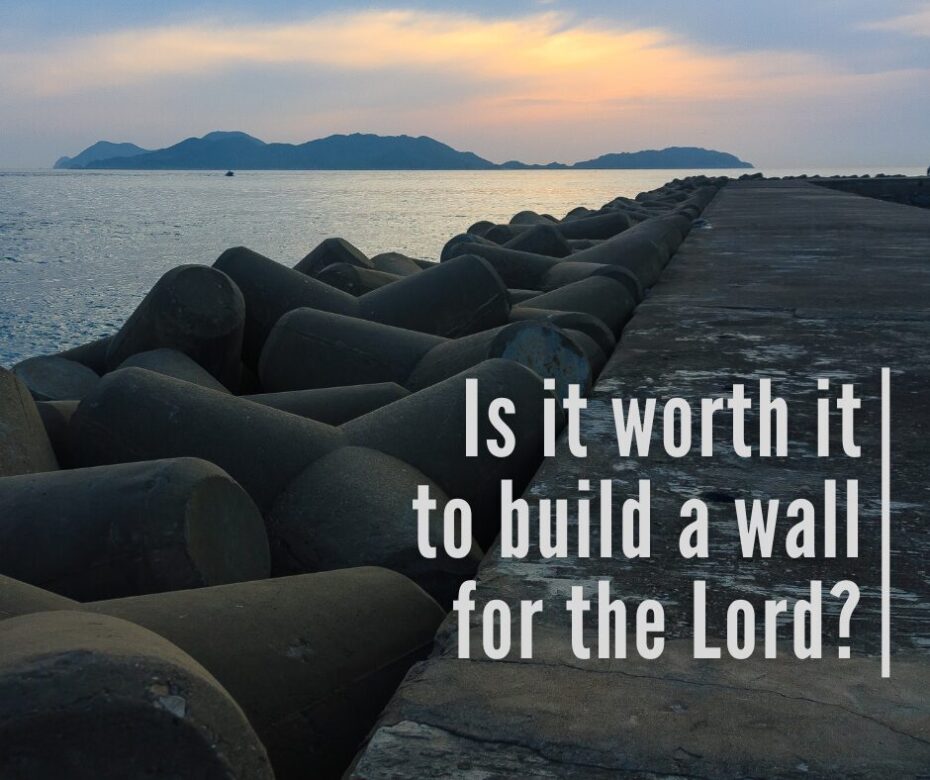In the 1960’s, a man named Kotoko Wamura governed the Japanese town of Fudai. During his years as mayor, he commissioned the construction of a seawall. Due to tsunamis in the region, many coastal towns like Fudai have seawalls, but Wamura’s wall was considered an overreaction, towering over fifty feet tall. It was the largest in the area. It was also extremely costly. As a result of his building the wall, Wamura suffered a fair amount of criticism. He was called “crazy, foolish, and wasteful” by the people. In 1997, Wamura passed away.
However, fourteen years after his death, a tsunami hit Fudai and the surrounding towns. It’s been estimated that over 20,000 people were killed, not to mention the destruction of numerous buildings and homes. Fudai was the exception. It was left almost completely untouched, all because of Wamura’s wall.
Wamura’s story reminded me of another building project. In Luke 14, the Lord is speaking about the cost of discipleship. He says that to be one of His disciples, the believer must be willing to hate his mother and father, his wife, children, and even his own life (v 26). Jesus then equates discipleship to building a tower. It’s a big project, so He instructs the would-be disciple to consider the cost of such an enterprise. We should sit down and first count the cost, lest we begin the project, then leave it unfinished (vv 28-30).
Of course, this is not a discussion about how someone receives eternal life. Eternal salvation is a free gift, not earned by sacrificially following the Lord (Eph 2:8-9; John 4:10, 14). This is a passage that deals with discipleship truths. It’s an invitation (vv 15-24) not only to enter the kingdom, but to be one of the Lord’s intimate partners in the coming world. It shows us that not all believers are willing to give up family and home for the Lord. It also teaches us that some believers will walk away before completing the work. However, for those who do pay the price and finish well, the reward will be great (14:11, 14).
Like Wamura’s wall, following the Lord is a massive undertaking and one that will come at a heavy price. In addition, it will invite ridicule and scorn, even among those who know you best—even by the people you are serving. It might cost you your family and your closest friends.
It should be said that the Lord doesn’t mean we should literally hate our families. To hate in this context deals with priorities. The Lord simply means that He must come before everyone and everything else. The result of living such a life will cause many to mock you. Like Wamura, people will say your life’s work is foolish.
I think there is another lesson that can be taken from Wamura’s story. Sometimes the results of our efforts won’t be revealed during our lifetime. Like Wamura, it can take years, decades, or even a lifetime, before the fruit of our labors can be seen. Many faithful believers may see few or no results of their work. They share the message of grace with people, they seek opportunities to shine a light in the darkness, and yet they face more hardships. Some have lost jobs and church communities. They try to sow the seed of grace on hard ground, and rarely, if ever, see the impact. They suffer the cost, without ever seeing any of the benefits. However, if I could add a word of encouragement: Wamura built a wall without knowing whether his work was worthwhile. By contrast, faithful believers know they will receive a return on their investment when the Lord returns (Rev 22:12).
It’s been said that Wamura’s wall brought the mayor vindication after his death. What was once deemed foolish brought the mayor honor and respect from his people. Similarly, there is a vindication coming for the faithful believer. To the one who builds his life on the words of our Savior, praise, and honor are sure to follow (1 Pet 1:6-7).

